
By Barsamian & Moody
In 2016, then Governor Jerry Brown signed Senate Bill 3, to provide a six step
statewide annual increase to California’s minimum wage. The new amended Labor Code
also provided that California employ a two-tiered minimum wage system, requiring “Large
Employers” (those with 26 or more employees) to pay a higher minimum wage than “Small
Employers” (those with 25 or fewer employees) until 2023.
According to the six-step increases, the minimum wage for both Large and Small
Employers should have been $15.00 on January 1, 2023. However, Senate Bill 3 also
required the California Director of Finance to adjust the minimum wage for inflation by
August 1, 2022 to be effective January 1, 2023, and then annually thereafter.
Therefore, effective January 1, 2023, all California employers, regardless of size,
will be required to meet the new minimum wage requirement of $15.50 per hour. The
minimum wage will be adjusted annually at the rate of inflation based on the national
consumer price index for urban wage earners and clerical workers (CPI-W). The
adjustment is capped at 3.5% per year and cannot be lowered if the inflation rate is
negative. The California Director of Finance will continue to adjust the minimum wage
based on inflation no later than August 1 of each year to be effective the following year
on January 1.
The increase to $15.50 affects non-exempt employees but also changes the
minimum annual salary requirements for exempt employees. Salaried employees who
are exempt from overtime compensation will have a new salary requirement of least
$64,480 on an annual basis ($5,373.34 per month).
What This Means for Employers:
Employers must adjust the pay rates for all employees earing less than $15.50 per
hour and for salaried exempt employees earning less than $64,480 annually. These
adjustments must be made before the first payroll run of the year which covers workdays
in 2023. If pay periods include 2022 and 2023, the hourly rate should be pro-rated
accordingly. Employers should also check their local minimum wage ordinances to
ensure there will not be a new minimum wage requirement which exceeds the new
California minimum wage.








